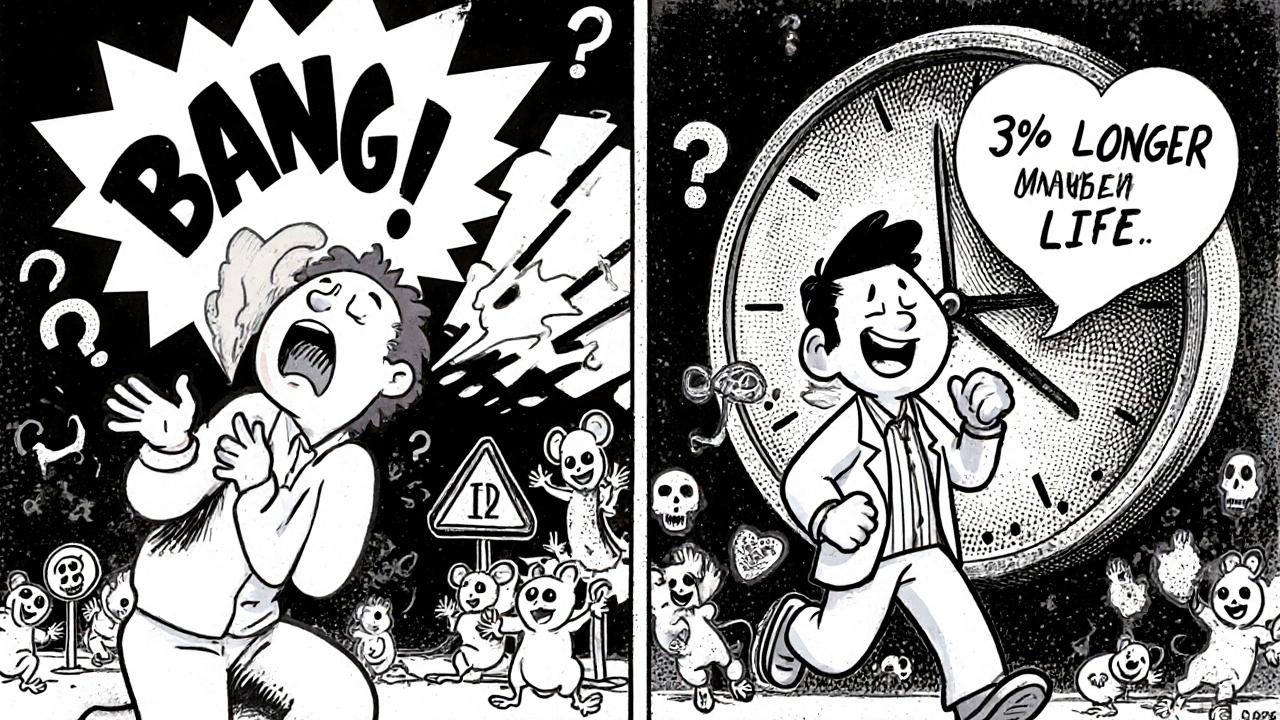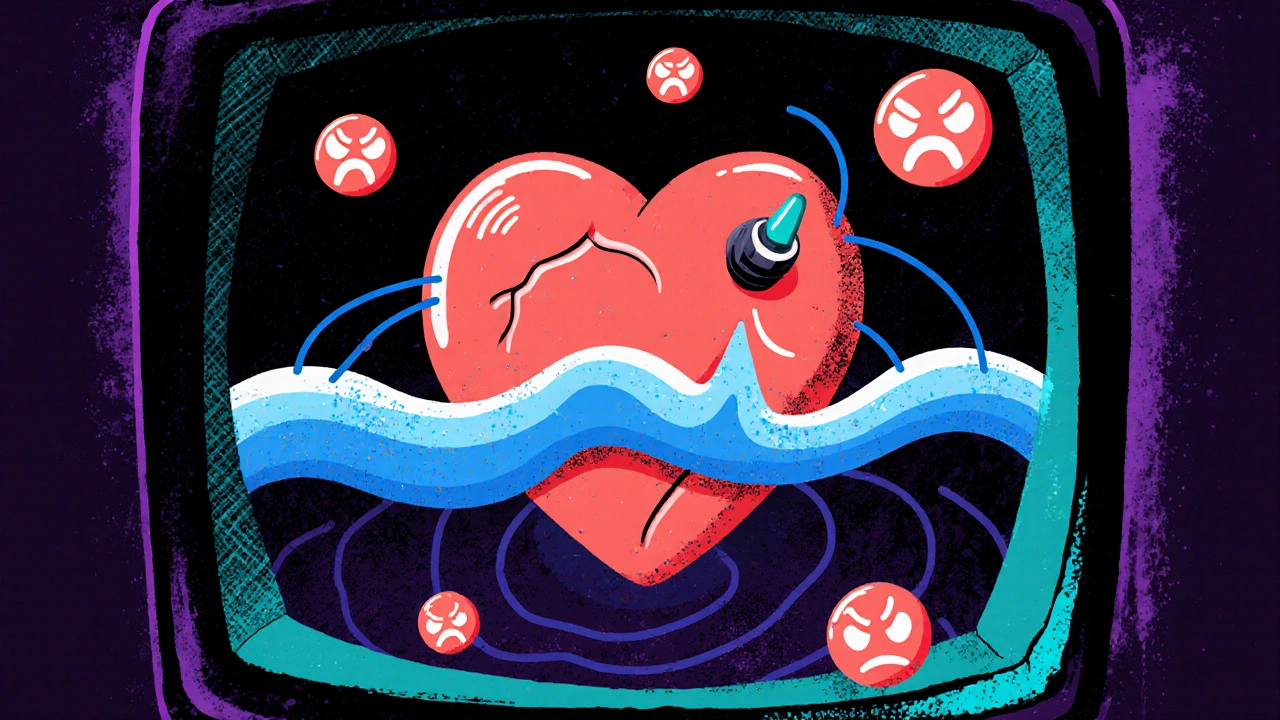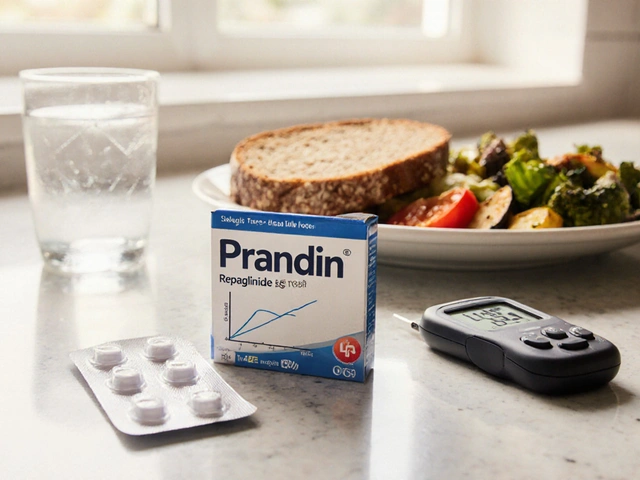Zebeta is the brand name for bisoprolol, a medication used to treat high blood pressure and certain heart conditions. It doesn’t cure these problems, but it helps manage them so you can live better, longer. If you’ve been prescribed Zebeta, you probably want to know how it actually works, what to expect, and whether it’s right for you. This isn’t just a list of side effects - it’s a clear look at what Zebeta does in your body, who benefits most, and what you need to watch out for.
How Zebeta Works in Your Body
Zebeta belongs to a class of drugs called beta blockers. These drugs target beta receptors in your heart and blood vessels. When adrenaline hits those receptors, your heart beats faster and your blood pressure rises. Zebeta blocks those signals. It doesn’t shut down your body’s natural stress response completely - it just turns down the volume.
Think of it like a volume knob on your heart. When you’re stressed, anxious, or physically active, your heart naturally speeds up. With Zebeta, that spike is smoother. Your heart doesn’t have to work as hard. Blood pressure drops. Your heart gets more oxygen. Over time, this reduces strain on your heart muscle and lowers your risk of heart attack or stroke.
Unlike some other beta blockers, Zebeta is selective. It mainly targets the beta-1 receptors in your heart, not those in your lungs or blood vessels. That’s why it’s often preferred for people with asthma or COPD - it’s less likely to cause breathing problems compared to older beta blockers like propranolol.
Who Prescribes Zebeta and Why
Zebeta is most commonly prescribed for three conditions:
- High blood pressure (hypertension) - It’s often a first-line treatment, especially for people over 55 or of African or Caribbean descent, as recommended by UK NICE guidelines.
- Chronic stable angina - If you get chest pain during exertion, Zebeta helps reduce how often it happens and how severe it feels.
- Heart failure - When the heart is weak, Zebeta helps it pump more efficiently over time. Studies show it reduces hospital stays and improves survival rates in people with mild to moderate heart failure.
It’s not used for sudden heart attacks or acute chest pain. Those need faster-acting drugs. Zebeta works slowly, over weeks. You won’t feel an immediate change, but your doctor will track your blood pressure and heart rate over time to see if it’s working.
Dosage and How to Take It
Zebeta comes in tablet form, usually in doses of 2.5 mg, 5 mg, or 10 mg. Most people start at 2.5 mg once a day. Your doctor might increase the dose after a few weeks if needed, but rarely goes above 10 mg daily.
Take it at the same time every day, preferably in the morning. You can take it with or without food. Swallow the tablet whole - don’t crush or chew it. Missing a dose? If you remember within a few hours, take it. If it’s almost time for your next dose, skip the missed one. Never double up.
It takes about 2 to 4 weeks for Zebeta to reach its full effect. Don’t stop taking it just because you feel fine. Stopping suddenly can cause your blood pressure to spike, your heart to race, or even trigger chest pain or heart attack. Always talk to your doctor before stopping.
Common Side Effects and When to Worry
Most people tolerate Zebeta well. But some side effects are common, especially when you first start:
- Feeling tired or dizzy
- Cold hands or feet
- Slow heartbeat
- Upset stomach or diarrhea
- Headache
These usually fade after a few weeks as your body adjusts. If they stick around or get worse, tell your doctor.
Call your doctor right away if you notice:
- Swelling in your ankles, legs, or feet
- Shortness of breath that’s new or worse
- Fainting or feeling like you’re going to pass out
- Signs of low blood sugar - sweating, shaking, confusion - especially if you have diabetes
Zebeta can hide the warning signs of low blood sugar. If you’re diabetic, you’ll need to check your blood sugar more often. Your doctor might adjust your diabetes meds.
What You Should Avoid
Some things can interfere with Zebeta or make side effects worse:
- Alcohol - It can lower your blood pressure even more, making you dizzy or faint.
- NSAIDs like ibuprofen - Regular use can reduce Zebeta’s effectiveness and raise your blood pressure.
- Other blood pressure meds - Taking more than one can drop your pressure too low. Your doctor will coordinate this carefully.
- Herbal supplements like St. John’s Wort or licorice root - These can affect how Zebeta works. Always tell your pharmacist what you’re taking.
Don’t start any new medication - even over-the-counter ones - without checking with your doctor first.
Who Shouldn’t Take Zebeta
Zebeta isn’t for everyone. Avoid it if you have:
- A very slow heart rate (bradycardia) without a pacemaker
- Low blood pressure that’s already causing dizziness
- Severe heart failure that’s not yet stabilized
- A history of allergic reaction to bisoprolol or similar drugs
- Severe circulation problems in your limbs (like Raynaud’s disease)
If you have asthma, COPD, or diabetes, Zebeta can still be used - but you’ll need closer monitoring. Your doctor will weigh the risks and benefits. It’s not a blanket no - it’s a careful yes.
How Zebeta Compares to Other Beta Blockers
There are many beta blockers on the market. Here’s how Zebeta stacks up:
| Medication | Dosing Frequency | Heart Selectivity | Best For | Key Risk |
|---|---|---|---|---|
| Zebeta (bisoprolol) | Once daily | High | Hypertension, heart failure, angina | Masking low blood sugar symptoms |
| Atenolol | Once daily | High | Hypertension | Less effective for heart failure |
| Metoprolol (XL) | Once daily | High | Heart failure, post-heart attack | More interactions with other drugs |
| Propranolol | 2-3 times daily | Low | Migraines, anxiety, tremors | Can worsen asthma |
Zebeta’s once-daily dosing and high heart selectivity make it one of the most convenient and well-tolerated options for long-term use. It’s often the go-to choice in the UK for hypertension and heart failure because of its proven safety record.

What to Expect Over Time
When you start Zebeta, you might feel a bit tired or notice your pulse is lower. That’s normal. Your doctor will likely check your blood pressure and heart rate after 2 weeks, then every 3 to 6 months once you’re stable.
Most people report feeling better over time - less shortness of breath, fewer chest pains, more energy. But it’s not a magic pill. It works best when paired with lifestyle changes: cutting salt, staying active, losing weight if needed, and not smoking.
Some people worry about becoming dependent. You’re not addicted to Zebeta. But your body gets used to it working. Stopping suddenly can be dangerous. Always taper off under medical supervision.
Long-Term Use and Safety
Zebeta has been used for over 30 years. Large studies, including the CIBIS trials, show it improves survival in heart failure patients by up to 34%. It’s one of the most studied beta blockers in the world.
Long-term use is generally safe. Kidney and liver function are monitored occasionally, especially in older adults. No major organ damage has been linked to Zebeta when taken as directed.
If you’re on Zebeta long-term, keep up with regular check-ups. Your doctor might check your electrolytes, kidney function, and blood sugar levels annually.
Can Zebeta cause weight gain?
Zebeta itself doesn’t cause weight gain. But some people feel less energetic when they start it, which can lead to reduced activity and weight gain over time. If you notice unexplained weight gain, especially with swelling, tell your doctor - it could be fluid retention from heart failure worsening, not the drug.
Is Zebeta safe during pregnancy?
Zebeta is not usually recommended during pregnancy unless absolutely necessary. It can reduce blood flow to the placenta and may affect the baby’s heart rate or growth. If you’re pregnant or planning to be, talk to your doctor about safer alternatives like labetalol or methyldopa.
Can I drink coffee while taking Zebeta?
Moderate caffeine is usually fine. But large amounts of coffee or energy drinks can raise your blood pressure and heart rate, which might counteract Zebeta’s effect. One or two cups a day is unlikely to cause issues, but avoid binge drinking caffeine.
Does Zebeta affect sleep?
Some people report trouble sleeping or vivid dreams. This is more common with beta blockers that cross the blood-brain barrier. Zebeta does this less than others, but if sleep problems start after beginning treatment, talk to your doctor. Taking it in the morning instead of at night can help.
What happens if I take Zebeta and forget I’m diabetic?
Zebeta can mask the symptoms of low blood sugar - like a fast heartbeat or shaking. You might only feel sweaty or confused. If you’re diabetic, check your blood sugar more often, especially when starting or changing your dose. Don’t rely on your pulse to tell you if your sugar is low.
Next Steps If You’re on Zebeta
If you’re taking Zebeta, here’s what to do next:
- Keep taking it as prescribed - even if you feel fine.
- Track your blood pressure at home if possible. Write down readings to share with your doctor.
- Get your heart rate checked regularly. A resting pulse under 50 may be normal on Zebeta, but if you feel faint, call your doctor.
- Review all other medications with your pharmacist - including vitamins and herbal supplements.
- Plan your next check-up. Don’t wait until you feel worse.
Zebeta isn’t flashy. It doesn’t make headlines. But for millions of people, it’s the quiet, reliable drug that keeps them out of the hospital and alive longer. If your doctor prescribed it, they chose it for a reason. Trust the science - and don’t stop without talking to them first.







Comments
Angela J
November 18, 2025 AT 16:02 PMOkay but have you ever wondered if Zebeta is just a cover-up for Big Pharma’s real agenda? I read a guy on YouTube who said beta-blockers are secretly used to suppress emotional expression so people don’t revolt against the system. My cousin’s neighbor’s dog started acting weird after his owner took it - no barking, just staring into space. Coincidence? I think not.
Also, why is it always prescribed to elderly folks? Are they being quietly retired from life? I’m not saying it’s evil… but I’m not not saying it’s evil.
And don’t get me started on the ‘once daily’ thing. That’s not convenience - that’s surveillance. They want you to take it at the same time so they can track your habits. I stopped mine. Now I drink celery juice and chant mantras. My BP’s lower than ever. 🌿
Sameer Tawde
November 20, 2025 AT 11:16 AMGreat breakdown. Zebeta’s not glamorous, but it’s one of those quiet heroes in cardiology. If you’re on it, don’t panic about the fatigue - give it 3 weeks. Your body’s recalibrating, not breaking down.
And yes, it masks low sugar symptoms - diabetics, please test more often. But don’t skip it because of fear. The benefits? Huge. Stay consistent. Your heart will thank you.
Erica Lundy
November 22, 2025 AT 05:42 AMThe philosophical underpinnings of pharmacological intervention are worth contemplating: we are not merely treating physiological dysfunction, but negotiating the boundaries of autonomy against biological determinism.
Zebeta, in its quiet efficacy, represents a paradox - a chemical restraint that grants freedom. It does not eliminate stress, but tempers its expression, allowing the self to persist within a constrained physiological landscape.
One must ask: is the reduction of heart rate an act of healing, or a subtle surrender to the demands of a world that demands constant performance? The pill does not answer. The physician merely prescribes. The patient, in swallowing it, performs an act of existential compliance.
And yet - and yet - if this compliance permits life, is it not the most profound form of dignity?
One cannot dismiss the empirical. The CIBIS trials are not myth. But neither are they narrative. They are silence made measurable.
Kevin Jones
November 23, 2025 AT 08:08 AMHigh beta-1 selectivity = optimized receptor kinetics with reduced off-target adrenergic blockade. That’s why bisoprolol > propranolol in COPD/asthma cohorts.
Pharmacokinetics: 90% oral bioavailability, T1/2 = 10–12 hrs, renal excretion dominant - hence caution in CKD.
And yes, it masks hypoglycemic adrenergic symptoms - that’s not a side effect, it’s a pharmacodynamic feature. Diabetics: monitor glucose religiously.
Bottom line: it’s a Class I, evidence-based, guideline-endorsed agent. Stop the fear-mongering.
Premanka Goswami
November 25, 2025 AT 04:36 AMThey say Zebeta helps your heart… but what if your heart isn’t the problem? What if your heart is fine - but your soul is being drained by the system? Who’s really prescribing this? The doctors? Or the algorithm that tracks your credit score and decides you’re ‘at risk’?
I heard a guy in Bangalore who worked at a pharmaceutical warehouse - he said 80% of these pills are just sugar coated with corporate propaganda.
And why is it always ‘once daily’? Why not twice? Why not three times? Because they want you docile. Controlled. Quiet.
They don’t want you to feel. They want you to survive - but not live.
Ask yourself: who profits when you’re on a beta-blocker for 30 years?
…I’m not saying it’s poison. I’m saying - question everything.
Alexis Paredes Gallego
November 25, 2025 AT 11:06 AMSo let me get this straight - you’re telling me a drug that slows your heart, makes you tired, hides low blood sugar, and makes your hands cold… is ‘safe’?
And you’re just gonna swallow it because some guy in a white coat said so?
What about the 2008 study that linked beta-blockers to increased depression risk? Oh wait - that was ‘retracted’ because it ‘didn’t meet statistical thresholds’.
And don’t even get me started on the VA’s secret database of veterans who developed chronic fatigue after being put on Zebeta. Classified. Buried. Suppressed.
They want you numb. They don’t want you awake. They don’t want you angry. They want you compliant.
I’m not on it. I’m on cold showers and rage yoga. My BP is 110/70. My pulse is 58. I’m alive. And I’m not medicated.
Wake up.
They’re not treating you.
They’re programming you.
Saket Sharma
November 27, 2025 AT 01:03 AMLet’s cut through the fluff: Zebeta is a first-line drug for a reason. It’s not ‘magic’. It’s math.
Cardiac output reduction + reduced myocardial oxygen demand = lower risk of MI and sudden death.
Studies? CIBIS-II, MERIT-HF, ALLHAT - all gold-standard RCTs.
Side effects? Manageable. Non-compliance? Deadly.
If you’re scared of side effects, you’re not ready for adulthood.
Take it. Track it. Live longer.
That’s not a recommendation.
That’s medicine.
Shravan Jain
November 27, 2025 AT 08:33 AMzZzZzZ… so the article says zebeta is 'selective' for beta-1 receptors... but did they mention the 2017 meta-analysis that showed 17% of patients still had bronchospasm? i mean... 'less likely' doesn't mean 'safe'.
also... 'don't stop suddenly' - yeah, duh. but why is that never explained in layman terms? because the pharma reps don't want you to think.
and why is the dosing chart so vague? 2.5mg to 10mg? that's like saying 'eat less sugar' and calling it a diet.
also... 'check with your doctor before taking supplements' - sure. but who's gonna check if the doctor is just pushing pills because of kickbacks?
we're all just lab rats with insurance cards.
Brandon Lowi
November 29, 2025 AT 01:01 AMLet me tell you something - America is being medicated into submission.
Zebeta? It’s not medicine - it’s a psychological leash. They don’t want you to feel your emotions - they want you to be quiet, compliant, and profitable. A slow heart rate? That’s not health - that’s numbness.
And don’t you DARE tell me about ‘evidence-based’ when the FDA’s approval process is run by ex-pharma executives!
They don’t care if you live longer - they care if you live longer… while buying their next pill.
Meanwhile, in China, they use acupuncture and qi gong - and guess what? Their heart disease rates are lower - and they don’t have a single beta-blocker ad on TV!
Wake up, sheeple!
Freedom isn’t a pill - it’s a pulse.
And if your pulse is too slow… maybe you’re not sick.
Maybe you’re just asleep.